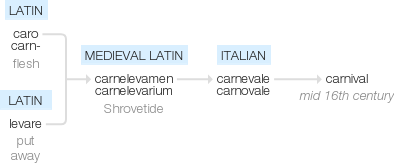Carnival
mid 16th century: from Italian carnevale, carnovale, from medieval Latin carnelevamen, carnelevarium ‘Shrovetide’, from Latin caro, carn- ‘flesh’ + levare ‘put away’.
wiktionary
From French carnaval, from Italian carnevale, possibly from the Latin phrase carnem levāmen ("meat dismissal"). Other scholars suggest Latin carnuālia ("meat-based country feast") or carrus navālis ("boat wagon", "float") instead. [1]
etymonline
carnival (n.)
1540s, "time of merrymaking before Lent," from French carnaval, from Italian carnevale "Shrove Tuesday," from older Italian forms such as Milanese *carnelevale, Old Pisan carnelevare "to remove meat," literally "raising flesh," from Latin caro "flesh" (originally "a piece of flesh," from PIE root *sker- (1) "to cut") + levare "lighten, raise, remove" (from PIE root *legwh- "not heavy, having little weight").
Folk etymology is from Medieval Latin carne vale " 'flesh, farewell!' " From 1590s in figurative sense "feasting or revelry in general." Meaning "a circus or amusement fair" is attested by 1926 in American English.
